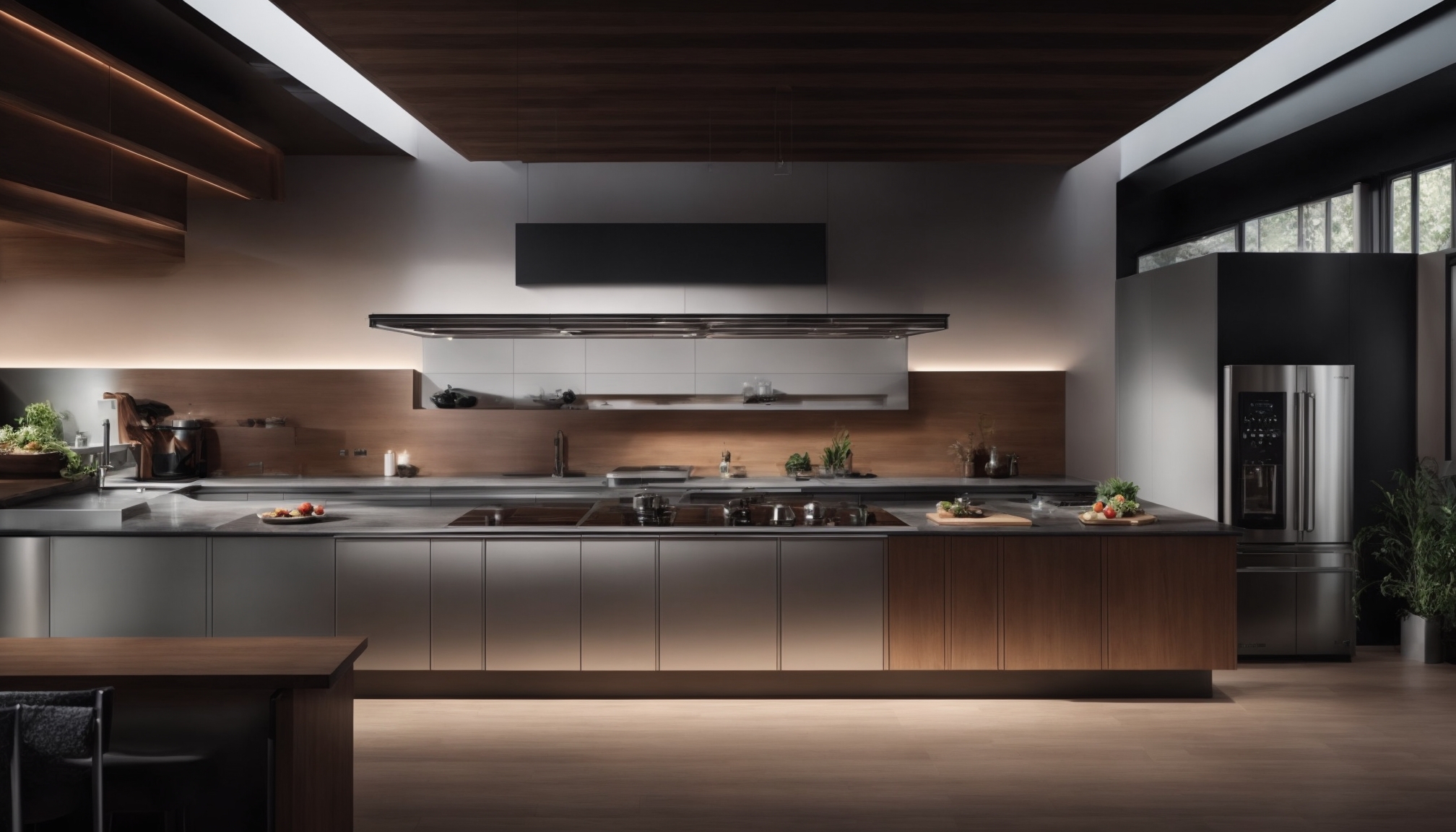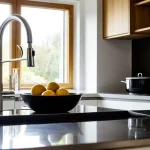The State of Kitchen Innovation in the UK
In the rapidly evolving world of kitchen technology trends UK homeowners are witnessing remarkable advancements. The landscape of kitchen innovations UK is marked by a shift towards smart, efficient, and sustainable solutions. Key players in UK home appliances are increasingly embedding connectivity and automation features to meet the rising demand for convenience without compromising quality.
A notable trend is the integration of smart devices that communicate with mobile apps, allowing users to control ovens, refrigerators, and dishwashers remotely. Energy efficiency remains a priority, driving innovations in eco-friendly appliances that align with environmental consciousness.
Topic to read : How are UK kitchens maximizing small spaces with innovative storage solutions?
Furthermore, consumer preferences are steering towards multifunctional designs that maximize space and usability, reflecting changing lifestyles. Kitchen innovations UK also emphasize intuitive interfaces and adaptive technologies that cater to diverse household needs, including accessibility features.
This combination of technological advancement and consumer-centric design positions the UK market at the forefront of kitchen innovation, blending tradition with modernity to enhance cooking and living experiences. The ongoing development in UK home appliances mirrors the broader trend of digital transformation in home environments, ensuring kitchens become smarter and more responsive to user demands.
Topic to read : How is the minimalist trend shaping UK kitchen aesthetics?
Smart Appliances Reshaping Home Cooking
Smart kitchen appliances UK are transforming how households approach meal preparation. These devices, connected through Wi-Fi or Bluetooth, offer seamless control and automation, redefining convenience in the connected kitchen UK environment. Among the most prominent are smart ovens, which allow remote cooking adjustments via smartphone apps. For instance, users can preheat the oven or modify temperatures without being physically present, making meal timing far more flexible.
This integration of technology brings multiple benefits to cooking routines. Automation reduces manual input, ensuring consistency and precision in cooking results. Time-saving features help busy individuals maintain a balanced lifestyle without compromising on meal quality. Beyond ovens, smart fridges equipped with inventory tracking notify users about expiry dates and suggest recipes, further easing meal planning.
Practical use of smart appliances extends to combined ecosystems where devices communicate, enhancing efficiency. For example, a smart oven can sync with a connected kitchen hub to adjust cooking times based on ingredient freshness detected by the fridge. This level of coordination exemplifies how remote cooking capabilities and device integration in the smart kitchen UK revolutionize home cooking, providing superior control and improved culinary outcomes.
Enhancing Kitchen Efficiency and Convenience
Efficiency in the kitchen is key to managing busy schedules, especially with the rise of efficient cooking UK trends. Incorporating convenience kitchen gadgets transforms meal prep from a chore into an enjoyable, streamlined process. These gadgets are designed to accelerate tasks such as chopping, mixing, or blending, allowing for quick meal prep without sacrificing quality.
Multi-functional appliances have become indispensable. They combine several functions—such as steaming, slow cooking, and sautéing—into one compact unit. This versatility not only reduces kitchen clutter but also enables users to multitask effortlessly, freeing up precious time. For example, a single appliance can function as a pressure cooker and rice cooker, simplifying the cooking routine while maximizing efficiency.
In real life, these technologies help home cooks optimize time, whether preparing weeknight dinners or hosting gatherings. By focusing on multitasking appliances, kitchens become hubs of productivity that accommodate diverse cooking styles and schedules. Embracing these innovations can ease the burden of daily meal preparation and make cooking a more accessible and satisfying experience.
Sustainable and Eco-Friendly Kitchen Solutions
When designing a kitchen with sustainability in mind, choosing sustainable kitchen materials UK is a crucial first step. Materials such as bamboo, reclaimed wood, and recycled glass significantly reduce environmental impact while maintaining durability and style. These options reflect increasing consumer demand for eco-conscious choices that balance aesthetics and responsibility.
Alongside materials, selecting eco-friendly appliances is pivotal. Energy-efficient refrigerators, induction cooktops, and low-water-use dishwashers lower household energy consumption without sacrificing performance. Many green kitchens UK incorporate smart technology to optimize usage further, cutting waste and emissions.
Recycling and waste reduction technologies complement these efforts. Integrated composters and waste separation systems encourage sustainability daily by minimizing landfill contributions. This technology aligns with growing awareness around circular economies and responsible consumption in contemporary green kitchens UK.
Consumers are actively seeking kitchens that promote health and environmental stewardship. Demand for non-toxic finishes, energy-saving lighting, and water-efficient fixtures illustrates this trend. Ultimately, the shift toward sustainable kitchen materials UK and eco-friendly appliances fosters homes that are not only stylish but mindful of their ecological footprint.
Real-World Experiences: Chefs and Home Cooks Adapting
Chefs and home cooks across the UK are increasingly integrating kitchen technology into their routines, enhancing the user kitchen experience UK significantly. Many professional chefs praise the precision and consistency that modern devices bring, allowing them to maintain high standards even during busy services. For example, smart ovens and temperature-controlled tools simplify complex techniques, saving time while improving results.
Home cooking UK has also evolved with technology adoption. Users report that programmable appliances and connected devices help them plan meals more efficiently and experiment with new recipes. Such tools often encourage healthier eating and reduce cooking stress, making daily meal preparation more enjoyable.
However, adapting to new technology isn’t without challenges. Some users face a learning curve mastering device interfaces or troubleshooting connectivity issues. Experts recommend starting with simpler tech integration, gradually building confidence. Celebrated chefs suggest integrating technology as a complement—not a replacement—to traditional cooking skills, preserving creativity.
In sum, the chef technology adoption trend reflects a balance between innovation and practicality, offering diverse benefits while requiring thoughtful implementation for the best user kitchen experience UK.
Future Outlook for Kitchen Innovations in the UK
As the demand for convenience and efficiency grows, future kitchen innovations UK are set to revolutionise home cooking. Smart home cooking trends suggest an increase in appliances that communicate with each other to streamline meal preparation. For instance, AI-powered ovens and connected refrigerators are expected to become more widespread, adapting recipes based on available ingredients.
Emerging kitchen tech UK also points to advances in energy efficiency and sustainability. Innovations like induction cooking surfaces combined with smart temperature controls promise faster, safer heat management while reducing energy consumption. Moreover, voice-controlled assistants integrated into kitchen devices will enable hands-free operation, improving multitasking for busy households.
These changes will enhance cooking efficiency while offering personalised experiences, such as automated grocery replenishment or nutritional guidance tailored to individual diets. Consumers in the UK can watch for technologies blending artificial intelligence, Internet of Things connectivity, and eco-friendly designs. Such innovations aim to transform kitchens into more intelligent, adaptable spaces supporting both everyday meals and special culinary projects.
By embracing these trends, homeowners can look forward to smarter, greener kitchens that redefine how they approach cooking and food management.





